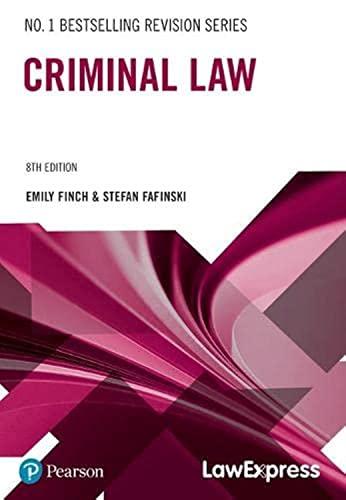Question
The Conscientious Employee Protection Act (CEPA) protects employee from any retaliatory action against them if the employee discloses, or threatens to disclose to a supervisor
The Conscientious Employee Protection Act (CEPA) protects employee from any retaliatory action against them if the employee discloses, or threatens to disclose to a supervisor or to a public body an activity, policy, or practice of the employer, or another employer, with whom business relationship, that the employee reasonably believes is: in short a violation or involves fraudulent or criminal activity (N.J.S.A. 34:19-3, 2016). Any violations from an aggrieved employee or former employee, has the ability, within one year to bring civil action N.J.S.A. 34:19-5, 2016). Finally, with N.J.S.A. 34:19-8, bringing attention that the act itself, will not diminish the rights, privileges, or remedies of any employee, to include any collective bargaining agreement or employment contract (2021). CEPA comes off as broadly, but to be understood in layman's terms. I believe it effectively translates to both employer and employee the rights in which the employee has. It also provides enough languages that the employee and employer understand that even with any contract or bargaining agreement, CEPA will still protect the employee.It is written in plain language and there should be a similar expectation of employee conduct as there is employer conduct in regards to the employees. There should not be a lower standard of performance expected by the employer, simply because they are the employer. It is the responsibility of the employer, the authority that exists for the employee, to create an environment in which the employee feels safe, and working for a "just" organization.
One interesting point under CEPA, is the definition of "employee:" any individual who performs services for and under the control and direction of an employee for wages of other remuneration (N.J.S.A. 34:19-2, 1997). This seems like the loophole, in which employers can find themselves as far asacting against an employee that may retaliate. The key word being "controlled,' may be used to identify an individual that may operate independently of a supervisor or boss per say. For instance, GREENMAN V. CITY OF HACKENSACK, Ms. Greenman was not hired by the City in the traditional sense, was not "controlled" by a specific boss, and could not be hired or fired by the City (2020).Although CEPA broadly, but seemingly effectively protects employees, it provides a lack of protection for employees that are not directly controlled or under the directions of an employer.
Greenman v. City of Hackensack, 486 F. Supp. 3d 811, 833 (D.N.J. 2020), on reconsideration in part, No. CV 15-3274 (KM)(MAH), 2021 WL 870712 (D.N.J. Mar. 9, 2021)
N.J. Stat. Ann. 34:19-1-1 through 34:19-1-8 (West)
Critical comment on a text above in 300 words.
Step by Step Solution
There are 3 Steps involved in it
Step: 1

Get Instant Access to Expert-Tailored Solutions
See step-by-step solutions with expert insights and AI powered tools for academic success
Step: 2

Step: 3

Ace Your Homework with AI
Get the answers you need in no time with our AI-driven, step-by-step assistance
Get Started


